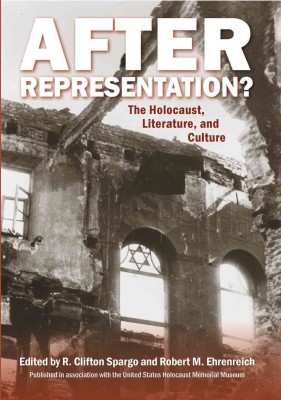| After Representation?: The Holocaust, Literature, and Culture None Edition Contributor(s): Spargo, R. Clifton Prof (Editor), Ehrenreich, Robert M. (Editor) |
|
 |
ISBN: 0813545897 ISBN-13: 9780813545899 Publisher: Rutgers University Press OUR PRICE: $60.75 Product Type: Hardcover Published: December 2009 Annotation: "After Representation?" explores one of the major issues in Holocaust studiesathe intersection of memory and ethics in artistic expression, particularly within literature. As experts in the study of literature and culture, the scholars in this collection examine the shifting cultural contexts for Holocaust representation and reveal how writersawhether they write as witnesses to the Holocaust or at an imaginative distance from the Nazi genocideaarticulate the shadowy borderline between fact and fiction, between event and expression, and between the condition of life endured in atrocity and the hope of a meaningful existence. What imaginative literature brings to the study of the Holocaust is an ability to test the limits of language and its conventions. "After Representation?" moves beyond the suspicion of representation and explores the changing meaning of the Holocaust for different generations, audiences, and contexts. |
| Additional Information |
| BISAC Categories: - Literary Criticism | Jewish - History | Holocaust - Social Science | Jewish Studies |
| Dewey: 809.933 |
| LCCN: 2008048079 |
| Physical Information: 0.75" H x 6" W x 9" (1.18 lbs) 256 pages |
| Themes: - Topical - Holocaust - Ethnic Orientation - Jewish |
| Descriptions, Reviews, Etc. |
| Publisher Description: After Representation? explores one of the major issues in Holocaust studies the intersection of memory and ethics in artistic expression, particularly within literature. As experts in the study of literature and culture, the scholars in this collection examine the shifting cultural contexts for Holocaust representation and reveal how writers whether they write as witnesses to the Holocaust or at an imaginative distance from the Nazi genocide articulate the shadowy borderline between fact and fiction, between event and expression, and between the condition of life endured in atrocity and the hope of a meaningful existence. What imaginative literature brings to the study of the Holocaust is an ability to test the limits of language and its conventions. After Representation? moves beyond the suspicion of representation and explores the changing meaning of the Holocaust for different generations, audiences, and contexts. |